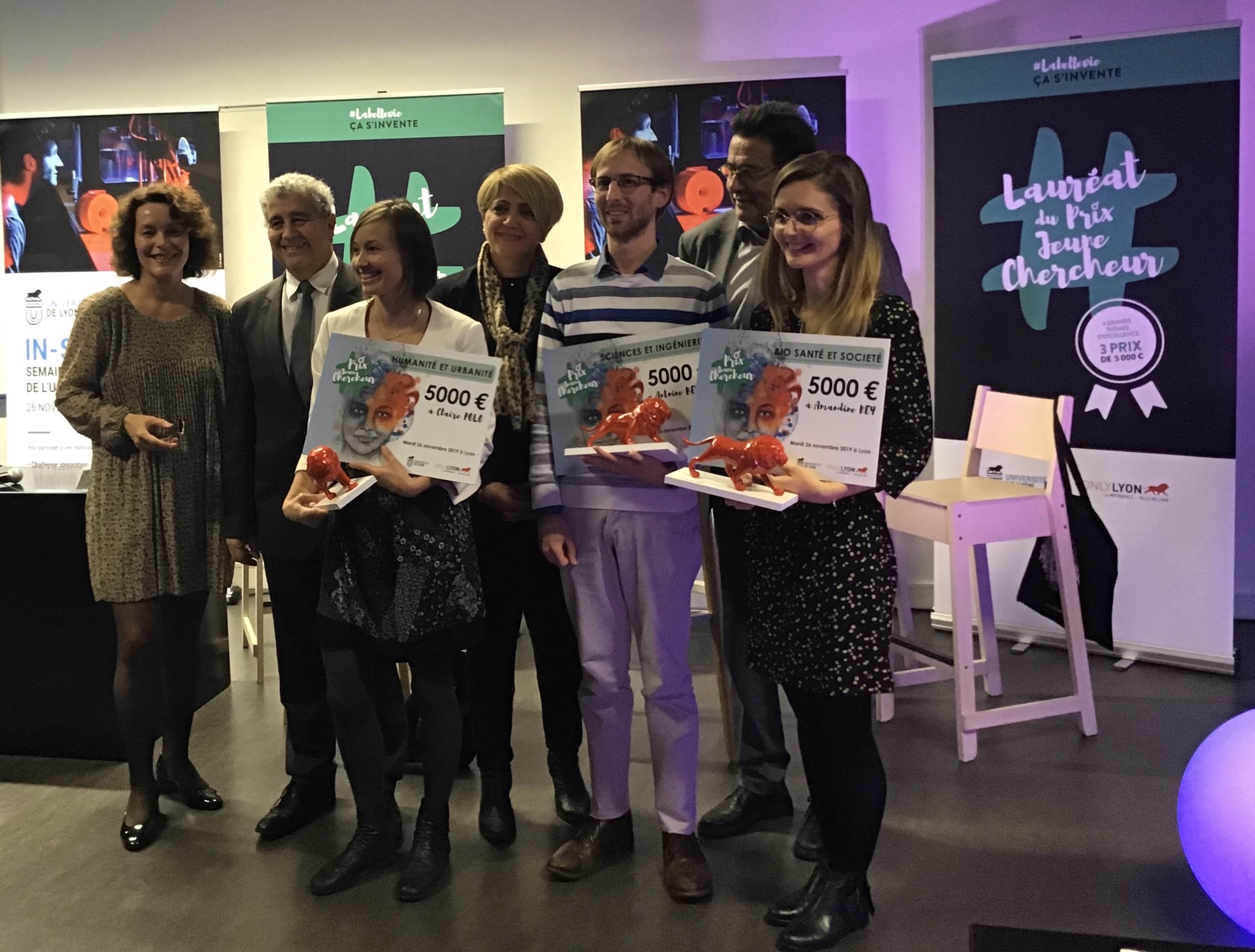Chaque année, la Métropole de Lyon, en partenariat avec l’Université de Lyon, récompense des jeunes chercheurs et chercheuses pour valoriser l’excellence scientifique lyonnaise. Le Prix du Jeune Chercheur, créé dans les années 80 par la Ville de Lyon, vise à valoriser l’excellence de la recherche fondamentale et appliquée des laboratoires de l’Université de Lyon.
Les prix sont remis à des docteurs âgés de moins de 35 ans dans 3 thématiques couvrant l'ensemble des champs disciplinaires : biosanté et société ; sciences et ingénierie ; humanités et urbanité.
Antoine Bérut a reçu son prix mardi 26 novembre à l'Université de Lyon lors de la soirée d'ouverture de IN-SITU, semaine de l'innovation de l'Université de Lyon.
Félicitations aux 3 lauréats : Amandine Rey (biosanté et société), Antoine Bérut et Claire Polo (humanités et urbanité).
Antoine Bérut a effectué sa thèse de doctorat au Laboratoire de Physique de l'ENS de Lyon, sous la direction de Sergio Ciliberto et Artyom Petrosyan, durant laquelle il a travaillé sur des questions de physique statistique hors d'équilibre. À l'aide de pinces optiques, il a étudié les fluctuations et interactions de particules microscopiques, soumises à l'agitation thermique. Il a validé ainsi expérimentalement le principe de Landauer selon lequel manipuler de l’information coûte une quantité minimale d’énergie. Travaux classés parmi les 10 découvertes de l'année 2012 par le magazine Physics World
Il a ensuite effectué deux post-doctorats. Un premier au laboratoire IUSTI sous la direction de Yoël Forterre, où il a travaillé sur le projet ERC "Plantmove", sur la détection de la gravité par les plantes (gravitropisme), les suspensions rhéo-épaississantes, et les écoulements de milieux granulaires Browniens. Puis un second à l'Institut de Physique de Rennes, sous la direction d'Isabelle Cantat, où il a travaillé sur le projet ERC "Disfilm", sur des questions de stabilité des mousses sous cisaillement.
Recruté maître de conférences à l'IUT Lyon 1 à la rentrée 2018, il a intégré l'équipe Liquides et Interfaces de l'ILM où il travaille sur des questions de matière molle comme des problématiques liées aux écoulements à petites échelles de suspensions denses de colloïdes, qui peuvent trouver des applications dans des domaines industriels (process agro-alimentaire, pharmaceutique), et dans les sciences géologiques (stabilité des sols, prévention des glissements de terrain).
Every year, the Lyon Metropolis, in partnership with the University of Lyon, awards young researchers to promote the scientific excellence of Lyon. The Young Researcher Award, created in the 1980s by the City of Lyon, aims to promote excellence in basic and applied research at the University of Lyon's laboratories. The prizes are awarded to PhDs under 35 years of age in 3 themes covering all disciplines: biohealth and society; science and engineering; humanities and urbanity.
Antoine Bérut received his award Tuesday, November 26 at the University of Lyon at the opening night of IN-SITU, innovation week at the University of Lyon.
Congratulations to the 3 winners: Amandine Rey (biohealth and society), Antoine Bérut and Claire Polo (humanities and urbanity).
Antoine Bérut completed his doctoral thesis at the ENS Physics Laboratory in Lyon, under the direction of Sergio Ciliberto and Artyom Petrosyan, during which he worked on issues of out of equilibrium statistical physics. Using optical tweezers, he studied the fluctuations and interactions of microscopic particles, subjected to thermal agitation. He thus experimentally validated Landauer's principle that manipulating information costs a minimal amount of energy. Works ranked among the 10 discoveries of 2012 by
Physics World magazine
He then did two post-doctorates. A first at the IUSTI laboratory under the direction of Yoël Forterre, where he worked on the ERC project "Plantmove", on the detection of gravity by plants (gravitropism), the rheo-thickening suspensions, and the flow of browniens granular media . Then a second at the Institute of Physics of Rennes, under the direction of Isabelle Cantat, where he worked on the ERC project "Disfilm", on issues of stability of foams under shear.
Recruited as a senior lecturer at IUT Lyon 1 in September 2018, he joined the iLM Liquids and Interfaces team where he worked on soft matter issues such as problems related to small scale flows of dense suspensions of colloids. , which can find applications in industrial fields (agro-alimentary process, pharmaceutical), and in geological sciences (soil stability, landslide prevention).


















